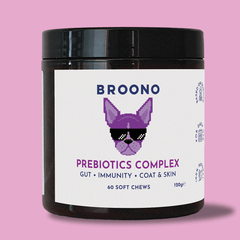
Liquorice root for Dogs
Glycyrrhiza glabra
Licorice root is derived from the Glycyrrhiza glabra plant and has been used for centuries in traditional medicine due to its anti-inflammatory, soothing, and immune-boosting properties. For dogs, licorice root is particularly valuable for its ability to reduce inflammation, support digestive health, and soothe respiratory issues. When used appropriately, it can be a natural remedy for a variety of health conditions.
Main Benefits of Licorice Root for Dogs
1. Anti-Inflammatory Properties
Licorice root contains glycyrrhizin, a compound known for its powerful anti-inflammatory effects. It works similarly to corticosteroids, reducing inflammation and relieving discomfort in dogs with conditions such as arthritis, allergies, and skin irritations. It can be particularly beneficial for dogs suffering from joint pain and swelling.
2. Soothes Digestive Issues
Licorice root has a natural ability to soothe the digestive system. It can help reduce gastritis, indigestion, and acid reflux by forming a protective barrier over the stomach lining. For dogs with upset stomachs or gastrointestinal inflammation, licorice root provides gentle relief and supports better digestion.
3. Supports Respiratory Health
Licorice root acts as a natural expectorant, helping to clear mucus from the respiratory tract. It is particularly helpful for dogs suffering from coughs, bronchitis, or upper respiratory infections. By soothing the airways and reducing inflammation, licorice root can make breathing easier for dogs with respiratory issues.
4. Natural Allergy Relief
Licorice root’s anti-inflammatory properties make it effective in reducing itching and irritation caused by allergies. It can help relieve the symptoms of seasonal allergies, skin rashes, and hot spots. Licorice root can be used as a natural alternative to corticosteroids for managing mild allergy symptoms in dogs.
5. Boosts Immune Function
Licorice root has been shown to enhance immune function by supporting the body’s natural defences against infections. It contains compounds that stimulate the production of immune cells, helping dogs fight off illnesses more effectively. This makes licorice root a useful supplement for dogs recovering from illness or injury.
6. Promotes Healthy Skin and Coat
In addition to soothing allergies, licorice root supports skin health by reducing inflammation and promoting healing. It is often used topically to relieve itching, hot spots, and skin infections. For dogs with dermatitis or other skin conditions, licorice root can provide relief and improve skin condition.
Why We Include Licorice Root in Our Supplements
We include licorice root in our supplements because of its powerful anti-inflammatory and soothing properties. Dogs with allergies, respiratory issues, or digestive discomfort benefit from licorice root’s natural ability to calm inflammation and promote healing. It’s particularly useful for dogs experiencing joint pain, itchy skin, or respiratory distress, offering a gentle yet effective alternative to conventional treatments.
How We Optimise the Dosage of Licorice Root
The dosage of licorice root in our supplements is carefully calculated to ensure that your dog receives the right amount for their size, age, and health condition. Since licorice root can have corticosteroid-like effects, we ensure the dosage is appropriate for long-term use without causing any side effects. Our supplements are formulated to provide the benefits of licorice root while maintaining a safe and balanced dosage for daily use.
The Bottom Line
Licorice root (Glycyrrhiza glabra) is a versatile herb that offers numerous benefits for dogs, including anti-inflammatory relief, digestive support, and respiratory health. As part of our supplements, licorice root helps soothe allergies, reduce joint pain, and support immune function. Including licorice root in your dog’s diet can provide natural relief from a range of health issues, promoting overall well-being.
Frequent Questions
1. How can I tell if my dog needs licorice root?
Dogs with conditions such as arthritis, allergies, respiratory issues, or digestive discomfort may benefit from licorice root. If your dog shows signs of itchy skin, joint pain, or coughing, consult your veterinarian to see if licorice root is appropriate.
2. Can my dog have too much licorice root?
While licorice root is generally safe for short-term use, prolonged or excessive use can cause side effects similar to corticosteroids, such as increased thirst, urination, or blood pressure issues. It’s important to follow the recommended dosage and consult your vet before using it long-term.
3. Is licorice root safe for long-term use?
Licorice root can be used for short periods, but it should be used cautiously for long-term treatment due to its corticosteroid-like effects. It’s recommended to cycle its use or consult with a vet to avoid potential side effects from prolonged use.
Liquorice root
contained in

